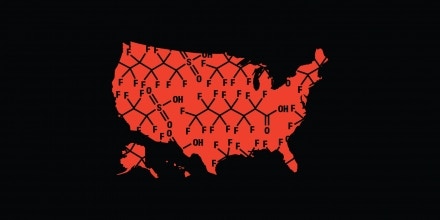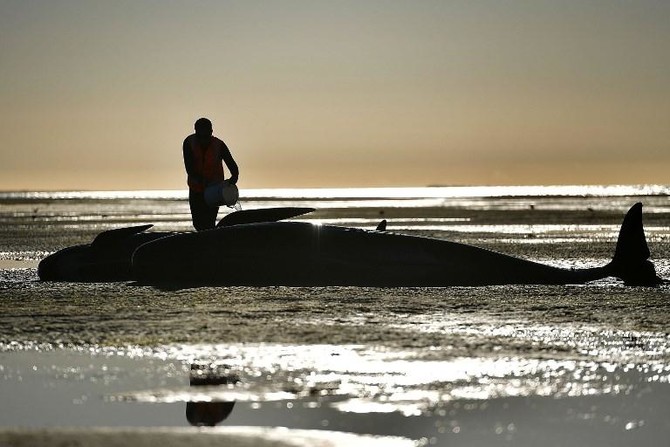Sharon
Lerner heeft op The Interecept een uitgebreid artikel
geschreven over de enorme plasticberg waar de wereld in dreigt te
verstikken en de pogingen van o.a. de oliemaffia om verboden tegen
gebruik van eenmalig plastic en andere plasticproducten tegen te
gaan…
De
manier waarop deze bedrijven e.e.a. doen is ernstige volksverlakkerij, zo
bestaat er een initiatief van bedrijven die bij de productie van
plastic zijn betrokken, waarmee men het volk wil laten geloven dat men er
alles aan doet om plastic uit het milieu te krijgen……
Zo
is er een organisatie met de naam ‘A Bag’s Life’, die een studentenproject
tot winnaar heeft uitgeroepen voor een doos waarop tanden te zien zijn in
de vorm van driehoeken met de woorden ‘Feed Me’ De
studenten die het project wonnen kregen ieder $ 100.00 en de
goegemeente gelooft dat ‘A Bag’s Life’, een onderdeel van de
American Progressive Bag Allience, werkelijk een organisatie is die
zich inzet tegen het gebruik van plastic…… Terwijl de American
Progressive Bag Allience een organisatie is die in het leven werd
geroepen door de Plastic Industry Association, een lobbyorganisatie
van: Shell
Polymers, LyondellBasell, Exxon Mobil, Chevron Phillips, DowDuPont en
Novolex…. En beste bezoeker deze organisatie is redelijk succesvol
in de VS…..
Ook hier
doen bedrijven als Shell, DSM en Unilever alsof ze ‘op het rechte groene pad
zijn’, echter in werkelijkheid doet men het tegenovergestelde,
terwijl de wereld zoals gezegd bijna letterlijk stikt in plastic….. Zo werd een
aantal maanden geleden bekend gemaakt dat bijna iedere aardbewoner microplastics in het lichaam heeft……..
Lerner
geeft verder een inkijk in de recyclingsindustrie en geeft met
cijfers aan dat er maar zeer weinig werkelijk wordt gerecycled
(lelijk anglicisme) en als klap op de vuurpijl blijken veel gerecyclede producten zwaar gif te bevatten, stoffen die o.a.
vrijkomen bij het recyclen van plastic…….
Ook
aandacht voor het verschepen van miljoenen tonnen aan westers
consumentenplastic, dat zogenaamd wordt gerecycled in landen als China
en de Filipijnen, waar het ‘recyclen’ bestaat uit plastic verbranden,
begraven of het openlijk op divers plekken te storten……. Uiteraard
gebeurt dit in de buurt waar arme mensen wonen, ofwel die betalen het
gelag in de vorm van een slechte gezondheid en een vroegtijdige akelige dood……..
Lees
het ontluisterende artikel van Lerner en geeft het door, tijd dat ook
onze politici stoppen met liegen en eindelijk wat doen, zoals hare
D66 leeghoofdigheid Stientje van Veldhoven, die tot 3 keer toe werd
gekozen tot groenste politicus van het jaar, maar die zo gauw ze aan
het bewind kwam de ‘terminologie van haar voorgangers’ (‘waar ze zo
tegen heeft gevochten…’) overnam en stelde dat de
industrie het zelf wel kan regelen….. Welnu van Veldhoven, ook in
het hieronder opgenomen artikel kan jij lezen hoe geweldig e.e.a. verloopt, smerige oplichter! Van Veldhoven wilde al jaren statiegeld
op kleine petflesjes en blik, iets waar de VVD mordicus tegen is, en zoals gezegd: net
aangetreden kwam van Veldhoven met het platgetreden cliché van haar
voorgangers………
Tot
slot wat betreft mijn schrijven hier: iedereen die meewerkt aan het
oplichten van het volk wat betreft plastic (en luchtvervuiling) zou strafrechtelijk moeten
worden vervolgd en voor jaren de bak in moeten draaien en dan meteen
via de ‘Pluk-ze’-wetgeving alle kapitaal van deze figuren confisceren en
gebruiken voor (echte) milieumaatregelen…… Wat een godvergeten
geteisem, gadver!!! (vergeet niet dat Exxon en Shell respectievelijk in de 70er en 80er jaren van de vorige eeuw uit eigen wetenschappelijk onderzoek al wisten dat de verbranding van fossiele brandstoffen de klimaatverandering heeft veroorzaakt, waar deze bedrijven dit niet alleen onder de pet hielden, maar zelfs wetenschappers inhuurden om dit te ontkennen……. Strafrechtelijke vervolging meer dan waard!!)
WASTE
ONLY
How
the Plastics Industry Is Fighting to Keep Polluting the World
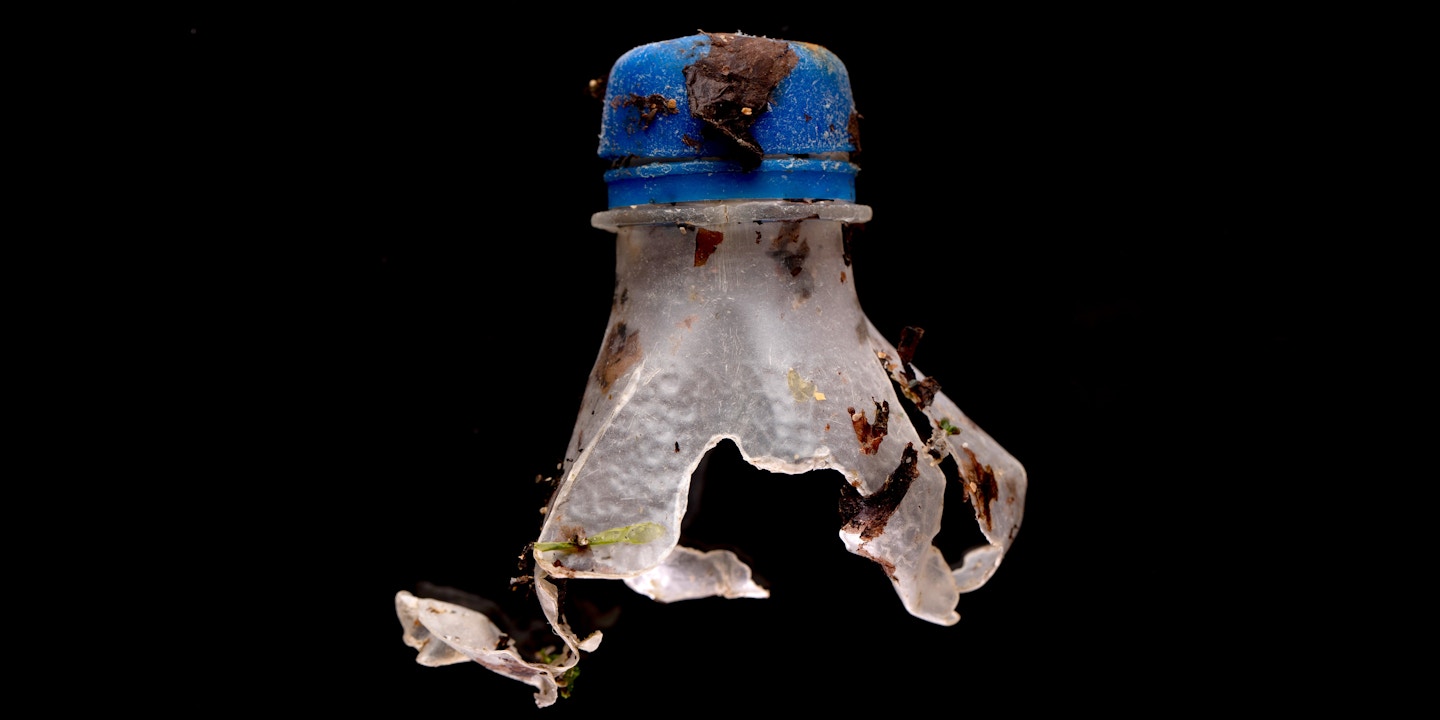
A
portion of plastic bottle found on Mothecombe Beach at the mouth of
the Erme Estuary in South Devon, England, on May 30, 2019. Photo:
Dan Kitwood/Getty Images
Sharon
Lerner July
20 2019, 1:30 p.m.
THE
STUDENTS AT Westmeade
Elementary School worked hard on their dragon. And it paid off. The
plastic bag receptacle that the kids painted green and outfitted with
triangular white teeth and a “feed me” sign won the students from
the Nashville suburb first place in a recycling box decorating
contest. The idea, as Westmeade’s proud principal told a local
TV news show,
was to help the environment. But the real story behind the dragon —
as with much of the escalating war over plastic waste — is
more complicated.
The
contest was sponsored by A
Bag’s Life,
a recycling promotion and education effort of the American
Progressive Bag Alliance, a lobbying group that fights restrictions
on plastic. That organization is part of the Plastics Industry
Association, a trade group that includes Shell Polymers,
LyondellBasell, Exxon Mobil, Chevron Phillips, DowDuPont, and Novolex
— all of which profit hugely from the continued production of
plastics. And even as A Bag’s Life was encouraging kids
to spread the uplifting message of cleaning up plastic waste, its
parent organization, the American Progressive Bag Alliance, was
backing a state bill that
would strip Tennesseans of their ability to address the plastics
crisis. The legislation would make it illegal for local governments
to ban or restrict bags and other single-use plastic products — one
of the few things shownto
actually reduce plastic waste.
A
week after Westmeade’s dragon won the contest, the APBA got its own
reward: The plastic preemption bill passed the Tennessee state
legislature. Weeks later, the governor signed it into law, throwing
a wrench into
an effort underway in Memphis to charge a fee for plastic bags.
Meanwhile, A Bag’s Life gave the Westmeade kids who worked on the
bag monster a $100 gift card to use “as they please.” And
with that, a minuscule fraction of its vast wealth, the plastics
industry applied a green veneer to its increasingly bitter and
desperate fight to keep profiting from a product that is polluting
the world.
A
Bag’s Life is just one small part of a massive, industry-led effort
now underway to suppress meaningful efforts to reduce plastic waste
while keeping the idea of recycling alive. The reality of plastics
recycling? It’s pretty much already dead. In 2015, the U.S.
recycled about 9 percent of its plastic waste, and since then the
number has dropped even lower. The vast majority of the 8.3 billion
metric tons of plastic ever produced — 79
percent —
has ended up in landfills or scattered all around the world. And as
for those plastic shopping bags the kids were hoping to contain: Less
than 1 percent of the tens of billions of
plastic bags used in the U.S. each year are recycled.
This
is not to say that we shouldn’t try to properly dispose of the
array of toys, single-use clamshells, bottles, bags, takeout
containers, iced coffee cups, straws, sachets, yogurt tubs, pouches,
candy bar wrappers, utensils, chip bags, toiletry tubes, electronics,
and lids for everything that passes through our lives daily. We have
to. But we are well past the point where the heartfelt efforts of
schoolchildren or anyone else on the consumer end can solve the
plastics problem. It no longer matters how many hoots we give. There
is already way too much plastic that won’t decompose and ultimately
has nowhere to go, whether it’s mashed into a dragon container or
not.
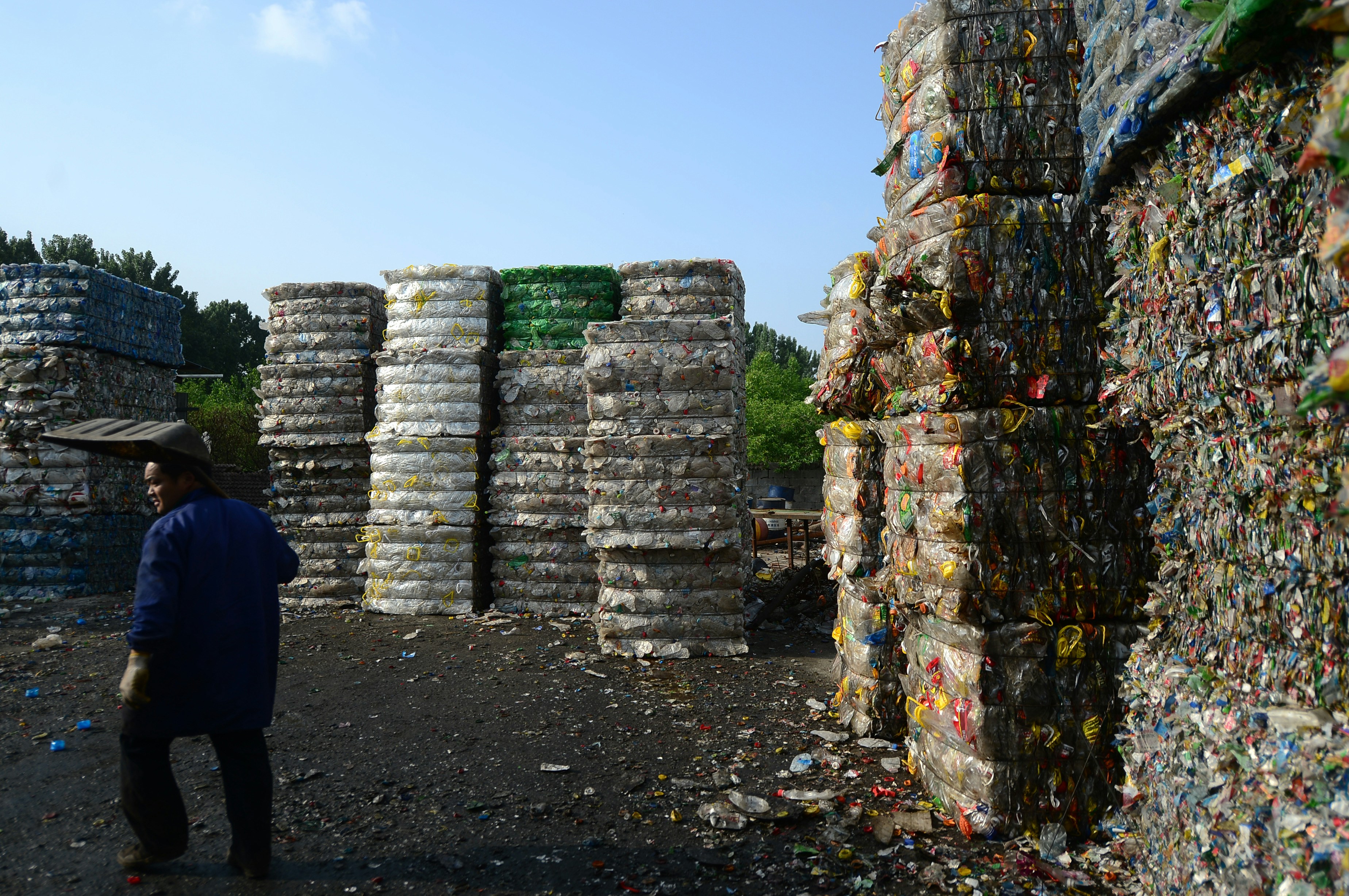
A
Chinese worker walks past piles of plastic bottles at a plastic
bottle recycling station in Ji’nan city, in east China’s Shandong
province, on May 4, 2017.Photo:
Imaginechina via AP Images
China’s
National Sword
China’s
decision in 2017 to stop receiving the vast majority of plastic waste
from other countries blew the flimsy lid off our dysfunctional
recycling system. That year, when the Chinese government announced
the National Sword policy, as it’s called, the U.S. sent 931
million kilograms of plastic waste to China and Hong Kong. The U.S.
has been offloading vast bundles of scrap this way since at least
1994, when the Environmental Protection Agency (EPA) began tracking
plastics exports. The practice has served to both mask the mounting
crisis and absolve U.S. consumers of guilt. But in fact, much of the
“recycled” plastic scrap that the U.S. sent to China appears to
have been burned or buried instead of being refashioned into new
products.
Although
China’s turnabout made the failure of the plastics recycling system
suddenly and undeniably obvious, in truth the plastics problem has
been with us as long as plastic has. Over the decades, as
production has grown exponentially, we’ve never managed
to repurpose even one-tenth of our plastic waste. Since the EPA began
tracking plastics recycling in 1994, when the U.S. recycled less than
5 percent, the rate went up only about 5 percent, peaking at 9.5
percent in 2014.
Although
there is no data before 1994, the rate was almost certainly even
lower then. Some of that failure can be blamed on careless consumers,
but much of the waste that is dutifully put into recycling bins and
bags also gets landfilled and burned because there’s no market for
it.
The
plastics problem has been growing exponentially for decades. In 1967,
when Dustin Hoffman’s character in “The Graduate” was being
advised to go into plastics, less than 25 million tons were produced
each year. Even back then, the companies that made the plastic were
already aware of
the growing waste problem. Yet by 1980, production had doubled. Ten
years later, it doubled again to 100 million tons, surpassing the
amount of steel produced globally. Today, the plastics industry,
estimated to be worth more than $4 trillion, generates more than 300
million tons of plastic a year according to the most recent
records — nearly half of which is for single-use items, meaning
that it will almost instantly become trash.
With
the institution of China’s new policy in January 2018, the extent
of the plastic waste crisis became dramatically more visible. Around
the world, bales of used plastic that just a year earlier would have
been destined for China began piling
up.
In the U.S., some cities have stopped
their plastics recycling programs
altogether.
Without
good alternatives, the U.S. is now burning six
times the amount of plastic it’s recycling — even though the
incineration process releases cancer-causing pollutants into the air
and creates toxic ash, which also needs to be disposed of somewhere.
And poor people are stuck with the worst consequences of the plastics
crisis. Eight
out of 10 incinerators
in the U.S. are in communities that are either poorer or have fewer
white people than the rest of the country, and residents living
near them are exposed to the toxic air pollution their combustion
produces.
Globally,
too, the problem is being dumped on the less fortunate and less
powerful. Because the U.S. can no longer ship its plastic waste to
China, much of that waste is going to Turkey, Senegal, and other
countries that are ill-equipped to deal with it. In May, the most
recent month for which data is available, the U.S. sent 64.9 million
kilograms of plastic scrap to 58 countries. Thailand, India, and
Indonesia — where more than 80 percent of waste is mismanaged,
according to data published
in Science — are among the countries that
now find themselves besieged with
U.S. plastic that’s being illegally dumped
and burned.
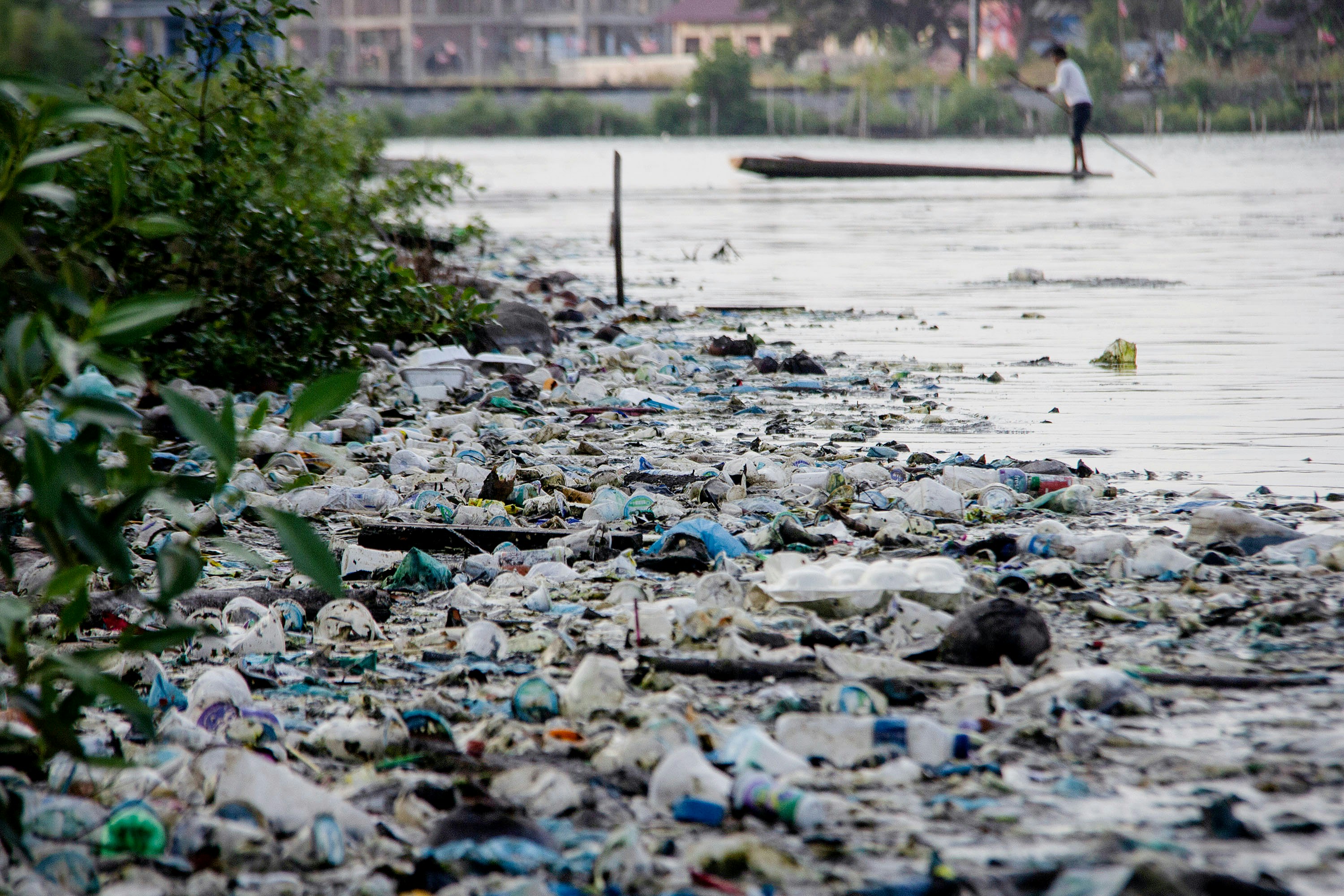
A
reservoir contaminated with plastic waste in Lhokseumawe, Indonesia,
on March 22, 2019. Photo:
Zikri Maulana/SOPA Images/LightRocket via Getty Images
All
the Plastics in the Seas
The
terrifying news about plastic seems to be as inescapable as the
plastic itself, tiny bits of which are now almost everywhere. One
study found these “microplastics” in the Pyrenees
mountain air 100
miles from the nearest city. Another found
that microplastics are being turned into sewage sludge and spread on
fields that grow food. And, as we know from the plastic-filled whales
that regularly wash
up dead,
the oceans are awash in plastic waste and now contain some 150
million tons of the stuff — a mass expected soon to surpass the
weight of all the fish in the seas.
We
humans also have plastic lodged in our bodies.
The substance often sold to us as protection from contamination is in
both food and
water.
Bottled
water, sales of which are increasing in
part because people are seeking alternatives to contaminated local
water supplies, now contains
plastic as well. A 2018
study found
that 93 percent of bottled water samples contained microplastics.
While all the big brands tested positive for microplastics, the worst
was Nestlé Pure Life, which claims that its
water “goes through a 12-step quality process, so you can
trust every drop.”
It’s
worth noting that in both 2017 and 2018,
Nestlé ranked in the top three among brands whose plastic trash was
most often collected in global cleanup efforts conducted by the
environmental group Break Free From Plastic.
The
confluence of terrible news has taken public outrage over plastic to
a new level. Once regarded mostly as an eyesore or a nuisance,
plastic waste is now widely understood to be a cause of species
extinction, ecological
devastation,
and human
health problems.
And because more than 99 percent of plastic is derived from oil,
natural gas, and coal — and because its destruction also uses
fossil fuels — environmental groups now recognize plastic as a
major contributor to climate
change.
Naturalist David
Attenborough has
likened the shift in public opinion over plastics to the process
through which the public reached a consensus on the harms of slavery.
Between
extraction, refining, and waste management, the production and
incineration of plastics will add more than 850 million metric tons
of greenhouse gases to the atmosphere this year alone — an amount
equal to the emissions from 189 500-megawatt coal power plants,
according to a report from
the Center for International Environmental Law.
Recycled
plastics — once seen as a sign of environmental virtue — is
increasingly recognized as posing threats to our health. Plastics
contain additives that determine its properties, including stability,
color, and flexibility. Most of the thousands of these
chemicals aren’t
regulated,
but it’s clear that some of those additives, which end up in
recycled plastics, are dangerous. One studyfound
that half of recycled plastics in India contained a flame
retardant
associated with neurological, reproductive, and developmental harms.
Black
plastic, used in everything from children’s
toys to kitchen
utensils,
food packaging, cellphone cases, and thermoses, appears to be
particularly dangerous. The plastic is often sourced from recycled
electronics that contain phthalates, flame
retardants,
and heavy metals, such as cadmium, lead, and mercury. Even at very
low levels, these chemicals can cause serious
reproductive and developmental problems.
But
most of the additives aren’t tracked or well studied. “The
industry has no idea what they’re putting in the plastic and who’s
putting it in,” said Andrew Turner, a British chemist who recently
found toxic chemicals in 40 percent of the black plastic toys,
thermoses, cocktail stirrers,
and utensils he tested.
In some plastic, he found the chemicals present at 30 times safety
standards set by governments.
Even
chemicals that are regulated often have limits set for electronics
but not for recycled products. “You’ve got something that
wouldn’t be compliant with the regulations as an electric item
because its levels are too high, but because it’s turned into a
fork, there’s nothing to stop it from being used,” Turner said.
Antimony, which Turner found in food containers, toys, and office
supplies, “is restricted in drinking water, but not in electrical
waste.” Turner and Zhanyun Wang, another scientist I spoke with who
studies chemical additives to plastics, told me that they no longer
use black plastic utensils. “Given the option, I’d prefer
something white or clear,” said Turner, adding that he tries to
avoid utensils made of any kind of plastic.
The
solution to this global mess clearly has to be much bigger than
personal cutlery choices. Among the organizations demanding that we
push past the idea of recycling and require corporations to limit
plastics production are Greenpeace,
the Surfrider
Foundation, As
You Sow,
the Rainforest
Alliance and 5Gyres,
an organization started by a couple who sailed across the Pacific
Ocean on a raft made out of discarded bottles. Fueled by a spike in
consumer frustration with products that make them complicit in the
problem, plastic-free restaurants and grocery
stores are
now emerging.
Taxes,
bans, and fees on plastic products have been catching on around the
world. In March, the European Union voted to ban single-use
plastics by 2021. In June, Canada followed suit, with Prime Minister
Justin Trudeau vowing to
not just ban single-use plastics such as bags, straws, and cutlery,
but also to hold plastics manufacturers responsible for their waste.
One hundred and forty-one countries, including China, Bangladesh,
India, and 34 African
countries,
have implemented taxes or partial bans on plastics.
In
the U.S., the Trump administration has
worked against international efforts to
crack down on plastic waste, so cities and towns are leading the way.
While only eight states have enacted plastic restrictions, more than
330 local plastic bag ordinances have passed in 24 states. Some
federal lawmakers have also recognized that federal action is
necessary to beat back the mounting tide of plastic. “Plastics
recycling is not a realistic solution to the plastic pollution
crisis. Most consumer plastics are economically impractical to
recycle based on market conditions alone,” Rep. Alan Lowenthal
and Sen. Tom Udall wrote in a letter to
President Donald Trump in June, noting that the “spread of
single-use plastic products has led to widespread pollution of
plastic in the U.S. and has caused a growing financial burden on
state agencies, local governments and taxpayers for remediation.”
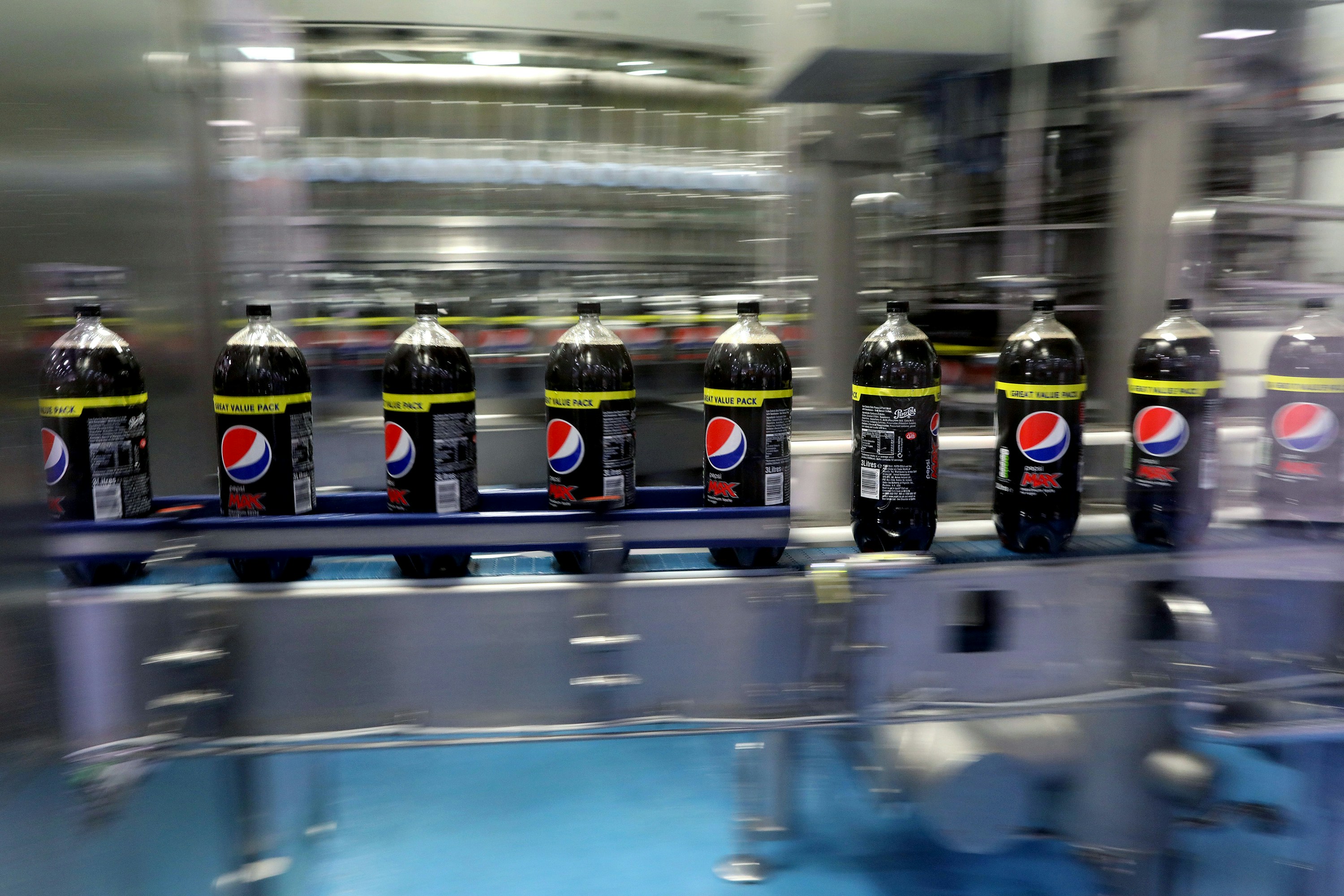
Bottles
of Pepsi Max travel along the production line at the Britvic PLC
factory and warehouse in Leeds, U.K., on Jan. 23, 2017. Photo:
Chris Ratcliffe/Bloomberg via Getty Images
Big
Plastic Fights Back
Even
the executives at a recent plastics industry conference admit how bad
the crisis is — at least to one another. All we hear is “you’ve
got to get rid of plastics,” Garry Kohl, of PepsiCo, said to his
fellow members of the Plastics Industry Association at a conference
in April. Gathered in the gilded ballroom of a Dallas hotel, the
representatives of big plastics manufacturers, recyclers, raw
materials providers, extruders, brand owners, and others in the
plastics business grappled aloud about their role in the crisis.
Especially difficult, said Kohl, who directs packaging innovation of
PepsiCo’s snacks and foods, was the widely circulated picture of a
dead plastic-filled albatross.
“This is very emotional for our senior leaders,” Kohl said, as
the now iconic picture of the albatross — really just a few
feathers and a decaying beak arranged around an assortment of bottle
caps, lighter parts, and plastic bits — flashed above him. “They’re
all talking about the albatross.”
Patty
Long, interim president and chief executive officer of the Plastics
Industry Association, the group that convened the Texas meeting, also
acknowledged the pain of being the public face of an industry held
responsible for the devastation of the natural world. Long admitted
that she squirmed her way through another social media phenomenon
that, along with the albatross, has changed the course of the war
over plastics: the video of
the sea turtle with a plastic straw jammed in its nostril. Long isn’t
the only one. Since it was posted in 2015, the eight excruciating
minutes in which marine biologists yank at the plastic straw with
pliers while the creature squirms and bleeds, has been viewed 36
million times.

In
this photo provided by the U.S. Fish and Wildlife Service, a black
footed albatross chick with plastics in its stomach lies dead on
Midway Atoll in the Northwestern Hawaiian Islands on Nov. 2, 2014.Photo:
Dan Clark/USFWS via AP
Klik hier voor het vervolg van het artikel
Read
Our Complete Coverage Bad
Chemistry
Voor meer berichten met D66 oplichter van Veldhoven, vul haar achternaam in op het zoekvlak aan de rechterbovenkant van deze pagina.

